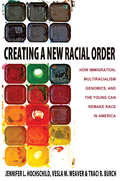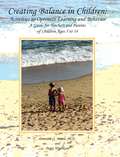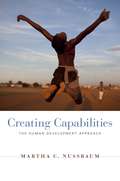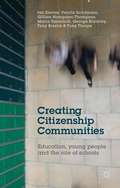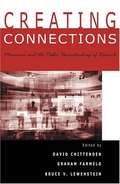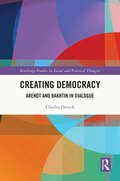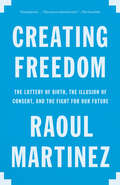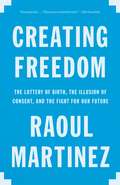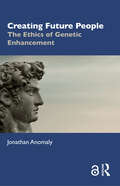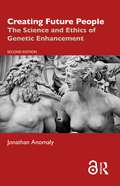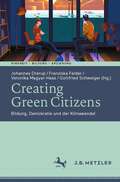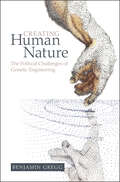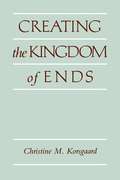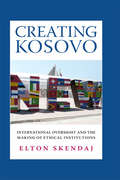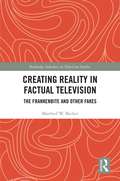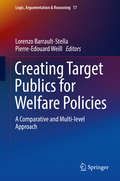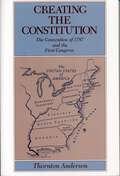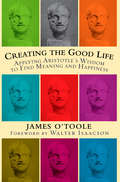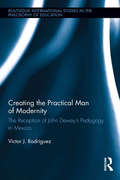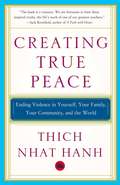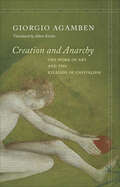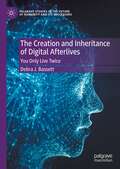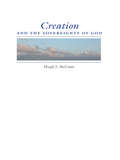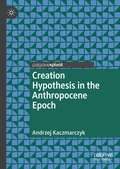- Table View
- List View
Creating a New Racial Order
by Vesla M. Weaver Jennifer L. Hochschild Traci R. BurchThe American racial order--the beliefs, institutions, and practices that organize relationships among the nation's races and ethnicities--is undergoing its greatest transformation since the 1960s. Creating a New Racial Order takes a groundbreaking look at the reasons behind this dramatic change, and considers how different groups of Americans are being affected. Through revealing narrative and striking research, the authors show that the personal and political choices of Americans will be critical to how, and how much, racial hierarchy is redefined in decades to come. The authors outline the components that make up a racial order and examine the specific mechanisms influencing group dynamics in the United States: immigration, multiracialism, genomic science, and generational change. Cumulatively, these mechanisms increase heterogeneity within each racial or ethnic group, and decrease the distance separating groups from each other. The authors show that individuals are moving across group boundaries, that genomic science is challenging the whole concept of race, and that economic variation within groups is increasing. Above all, young adults understand and practice race differently from their elders: their formative memories are 9/11, Hurricane Katrina, and Obama's election--not civil rights marches, riots, or the early stages of immigration. Blockages could stymie or distort these changes, however, so the authors point to essential policy and political choices. Portraying a vision, not of a postracial America, but of a different racial America, Creating a New Racial Order examines how the structures of race and ethnicity are altering a nation.
Creating Balance in Children: A Guide for Teachers and Parents of Children Ages 5 to 14
by Lorraine O. MooreEducate the whole child with over one hundred activities that promote physical, cognitive, and emotional/social balance in children!This insightful resource helps educators, parents, and childcare providers discover how emotions affect learning and behavior, recognize the symptoms and sources of imbalance, and promote students' physical, mental, emotional, and social development. Students and teachers will learn more about the body-mind-heart connection, the importance of nutrition, and options for correcting and preventing imbalance with over one-hundred activities.Using the author's flexible guidelines, teachers can help children develop attributes such as kindness and courage, love and joy, and a sense of meaning and interconnectedness. Creating Balance in Children: Activities to Optimize Learning and Behavior takes the lessons learned from Creating Balance in Children’s Lives and transforms them into easy-to-use activities for use in the home and the classroom.
Creating Capabilities: The Human Development Approach
by Martha C. NussbaumIf a country’s Gross Domestic Product increases each year, but so does the percentage of its people deprived of basic education, health care, and other opportunities, is that country really making progress? If we rely on conventional economic indicators, can we ever grasp how the world’s billions of individuals are really managing? In this powerful critique, Martha Nussbaum argues that our dominant theories of development have given us policies that ignore our most basic human needs for dignity and self-respect. For the past twenty-five years, Nussbaum has been working on an alternate model to assess human development: the Capabilities Approach. She and her colleagues begin with the simplest of questions: What is each person actually able to do and to be? What real opportunities are available to them? The Capabilities Approach to human progress has until now been expounded only in specialized works. Creating Capabilities, however, affords anyone interested in issues of human development a wonderfully lucid account of the structure and practical implications of an alternate model. It demonstrates a path to justice for both humans and nonhumans, weighs its relevance against other philosophical stances, and reveals the value of its universal guidelines even as it acknowledges cultural difference. In our era of unjustifiable inequity, Nussbaum shows how—by attending to the narratives of individuals and grasping the daily impact of policy—we can enable people everywhere to live full and creative lives.
Creating Citizenship Communities
by Ian Davies Vanita Sundaram Gillian Hampden-Thompson Maria Tsouroufli George Bramley Tony Breslin Tony ThorpeThis book addresses what is globally acknowledged to be one of the most fundamental and pressing concerns in contemporary society: the ways in which education can help young people understand - and play a full and active part - in contemporary society. On the basis of a national project funded by the Esmee Fairbairn Foundation and conducted as part of a partnership between the National Foundation of Educational Research and the Department of Education at the University of York, UK, the authors analyse data from young people and teachers to explore what they understand by citizenship and community and what they currently do, and would like to do, to promote more effective learning and engagement. On the basis of this research the authors make recommendations to enhance levels of understanding and opportunities for engagement in citizenship communities. "
Creating Connections: Museums and the Public Understanding of Current Research
by Bruce Lewenstein David Chittenden Graham FarmeloThis fundamentally human need to find out about the world led to the creation of this book.
Creating Democracy: Arendt and Bakhtin in Dialogue (Routledge Studies in Social and Political Thought)
by Charles HerschCreating Democracy brings into dialogue for the first time two important theorists of democracy: Hannah Arendt (1906–75) and Mikhail Bakhtin (1895–975). Their shared conception of democracy stemming from their encounters with totalitarian governments – Nazi Germany for Arendt and Stalinist Russia for Bakhtin – and the rise of authoritarian populism in both Europe and America make their ideas more relevant than ever.Charles Hersch contends that Arendt and Bakhtin have a unique vision of democracy that centers on creation and creativity. These two thinkers imagine a world that both makes room for the cultivation and expression of each person’s individuality and facilitates healthy interdependence, one that does not reduce us to sameness. They also describe the many threats to such a humanistic world, whether ideological, social, or political.Creating Democracy also makes a unique contribution to debates in political theory about the possibility of freedom in modern society. Offering an alternative to poststructuralism and liberalism, Arendt and Bakhtin show us how, in a variety of complex ways, subjects who are influenced by their culture, especially by the language in which they speak and think, can nonetheless help construct themselves and the world. For both thinkers, humans are meaning-making beings who shape the world, primarily through language, even as it shapes us. This book brings to light a rich vision of democracy that is sorely needed in a time when authoritarianism threatens us more than it has in decades. Students and scholars in political science, cultural studies, and literature will all find this book indispensable.
Creating Freedom: The Lottery of Birth, the Illusion of Consent, and the Fight for Our Future
by Raoul MartinezThe ideal of freedom is at the heart of our political and economic system. It is foundational to our sense of justice, our way of life, our conception of what it is to be human. But are we free in the way that we think we are?In Creating Freedom, Raoul Martinez brings together a torrent of mind-expanding ideas, facts, and arguments to dismantle sacred myths central to our society—myths about free will, free markets, free media, and free elections. From the lottery of our birth to the consent-manufacturing influence of concentrated power, this far-reaching manifesto lifts the veil on the mechanisms of control that pervade our lives. It shows that the more we understand how the world shapes us, the more effectively we can shape the world. A highly original exploration of the most urgent questions of our time, Creating Freedom reveals that we are far less free than we like to think, but it also shows that freedome is something we can create together. In fact, our very survival may depend on our doing so.
Creating Freedom: The Lottery of Birth, the Illusion of Consent, and the Fight for Our Future
by Raoul MartinezThe ideal of freedom is at the heart of our political and economic system. It is foundational to our sense of justice, our way of life, our conception of what it is to be human. But are we free in the way that we think we are?In Creating Freedom, Raoul Martinez brings together a torrent of mind-expanding ideas, facts, and arguments to dismantle sacred myths central to our society—myths about free will, free markets, free media, and free elections. From the lottery of our birth to the consent-manufacturing influence of concentrated power, this far-reaching manifesto lifts the veil on the mechanisms of control that pervade our lives. It shows that the more we understand how the world shapes us, the more effectively we can shape the world. A highly original exploration of the most urgent questions of our time, Creating Freedom reveals that we are far less free than we like to think, but it also shows that freedome is something we can create together. In fact, our very survival may depend on our doing so.
Creating Future People: The Ethics of Genetic Enhancement
by Jonathan AnomalyCreating Future People offers readers a fast-paced primer on how new genetic technologies will enable parents to influence the traits of their children, including their intelligence, moral capacities, physical appearance, and immune system. It deftly explains the science of gene editing and embryo selection, and raises the central moral questions with colorful language and a brisk style. Jonathan Anomaly takes seriously the diversity of preferences parents have, and the limits of public policy in regulating what could soon be a global market for reproductive technology. He argues that once embryo selection for complex traits happens it will change the moral landscape by altering the incentives parents face. All of us will take an interest in the traits everyone else selects, and this will present coordination problems that previous writers on genetic enhancement have failed to consider. Anomaly navigates difficult ethical issues with vivid language and scientifically informed speculation about how genetic engineering will transform humanity. Key features: Offers clear explanations of scientific concepts; Explores important moral questions without academic jargon; Brings discoveries from different fields together to give us a sense of where humanity is headed.
Creating Future People: The Science and Ethics of Genetic Enhancement
by Jonathan AnomalyCreating Future People offers readers a fast-paced primer on how advances in genetics will enable parents to influence the traits of their children, including their children’s intelligence, moral capacities, physical appearance, and immune system. It explains the science of gene editing and embryo selection and motivates the moral questions it raises by thinking about the strategic aspects of parental choice. Professor Anomaly takes seriously the diversity of preferences parents have, and the limits policymakers face in regulating what will soon be a global market for reproductive technology. Anomaly argues that once embryo selection for complex traits happens it will change the moral landscape by altering the incentives each person faces. All of us will take an interest in the traits everyone else selects, and this will present coordination problems that previous writers on genetic enhancement have failed to consider. Anomaly ends by considering how genetic engineering will transform humanity.Key Updates to the Second Edition Significant revisions to include more details about what will be scientifically possible in the coming years and the moral issues these developments will raise. New and substantial coverage of embryo selection (guided by polygenic scores) for minimizing the risk of genetic diseases. Engagement with all important, new publications on the science of genetic enhancement
Creating Green Citizens: Bildung, Demokratie und der Klimawandel (Kindheit – Bildung – Erziehung. Philosophische Perspektiven)
by Johannes Drerup Franziska Felder Veronika Magyar-Haas Gottfried SchweigerDer Zusammenhang zwischen liberaler Demokratie als Staats- und Lebensform, politischer und ökologischer Bildung und einer angemessenen Einrichtung und Neuausrichtung menschlicher Naturverhältnisse im Lichte des Klimawandels ist nicht zuletzt auf Grund der Bewegung „Fridays for Future“ ein Thema, das in der aktuellen öffentlichen Selbstverständigung dauerpräsent ist. Zugleich ist dieser Konnex mit Grundsatzfragen verbunden, die das Selbstverständnis liberaler Demokratien und ihrer Erziehungs- und Bildungssysteme in ihrem normativen Kern betreffen. In dem Band werden unterschiedliche miteinander verschränkte Problemdimensionen des Zusammenhangs zwischen Bildung, Demokratie und Klimawandel theoretisch und empirisch rekonstruiert, analysiert und diskutiert.
Creating Human Nature: The Political Challenges of Genetic Engineering
by Benjamin GreggHuman genetic enhancement, examined from the standpoint of the new field of political bioethics, displaces the age-old question of truth: What is human nature? This book displaces that question with another: What kind of human nature should humans want to create for themselves? To answer that question, this book answers two others: What constraints should limit the applications of rapidly developing biotechnologies? What could possibly form the basis for corresponding public policy in a democratic society? Benjamin Gregg focuses on the distinctly political dimensions of human nature, where politics refers to competition among competing values on which to base public policy, legislation, and political culture. This book offers citizens of democratic communities a broad perspective on how they together might best approach urgent questions of how to deal with the socially and morally challenging potential for human genetic engineering.
Creating The Kingdom Of Ends
by Christine M. KorsgaardChristine Korsgaard has become one of the leading interpreters of Kant's moral philosophy. She is identified with a small group of philosophers who are intent on producing a version of Kant's moral philosophy that is at once sensitive to its historical roots while revealing its particular relevance to contemporary problems. She rejects the traditional picture of Kant's ethics as a cold vision of the moral life which emphasises duty at the expense of love and value. Rather, Kant's work is seen as providing a resource for addressing not only the metaphysics of morals, but also for tackling practical questions about personal relations, politics, and everyday human interaction. This collection contains some of the finest current work on Kant's ethics and will command the attention of all those involved in teaching and studying moral theory.
Creating Kosovo: International Oversight and the Making of Ethical Institutions
by Elton SkendajIn shaping the institutions of a new country, what interventions from international actors lead to success and failure? Elton Skendaj's investigation into Kosovo, based on national survey data, interviews, and focus groups conducted over ten months of fieldwork, leads to some surprising answers. Creating Kosovo highlights efforts to build the police force, the central government, courts, and a customs service. Skendaj finds that central administration and the courts, which had been developed under local authority, succumbed to cronyism and corruption, challenging the premise that local "ownership" leads to more effective state bureaucracies. The police force and customs service, directly managed by international actors, were held to a meritocratic standard, fulfilling their missions and winning public respect. On the other hand, local participation and contestation supported democratic institutions. When international actors supported the demobilization of popular movements, Creating Kosovo shows, they undermined the ability of the public to hold elected officials accountable.
Creating Reality in Factual Television: The Frankenbite and Other Fakes (Routledge Advances in Television Studies)
by Manfred W. BeckerCreating Reality in Factual Television analyzes the uneasy interaction between economics, culture, and professional ethics in reality and documentary television storytelling. Through the "frankenbite," an editorial tool that extracts and re-orders the salient elements or single words of a statement, interview, or exchange into a revealing confession or argument, the book explores how and why editors manipulate truth in factual television. The author considers how the editing of documentary television is increasingly following reality television’s dictate to entertain instead of inform, how the "real" and the "truth" fall victim to the demand to "tell entertaining stories," and how editors must compromise their professional ethics as a result. Drawing on interviews with 75 North American and European editors that explore their experiences and opinions of reality and documentary television practices, and their views on their responsibilities and loyalties in the field, Creating Reality in Factual Television illuminates the real and potential ethical dilemmas of editorial decision making, the context in which decisions are made, and how editors themselves validate the editing choices to themselves and others. Addressing a dramatic development in contemporary media ecology – the age of "alternative facts" – this book is a useful research tool for scholars and students of documentary film, media literacy, genre studies, media ethics, affect theory, and audience perception.
Creating Scientific Controversies
by David HarkerFor decades, cigarette companies helped to promote the impression that there was no scientific consensus concerning the safety of their product. The appearance of controversy, however, was misleading, designed to confuse the public and to protect industry interests. Created scientific controversies emerge when expert communities are in broad agreement but the public perception is one of profound scientific uncertainty and doubt. In the first book-length analysis of the concept of a created scientific controversy, David Harker explores issues including climate change, Creation science, the anti-vaccine movement and genetically modified crops. Drawing on work in cognitive psychology, social epistemology, critical thinking and philosophy of science, he shows readers how to better understand, evaluate, and respond to the appearance of scientific controversy. His book will be a valuable resource for students of philosophy of science, environmental and health sciences, and social and natural sciences.
Creating Target Publics for Welfare Policies: A Comparative And Multi-level Approach (Logic, Argumentation And Reasoning Ser. #17)
by Pierre-Edouard Weill Lorenzo Barrault-StellaThis volume analyzes welfare policies by looking at the making of their target publics. It examines how these populations are identified and constructed by policy making. The contributors apply the classic theoretical question about who gets what, when, and how, but also suggest the revisiting of policy-feedback analysis. Coverage includes empirical case studies in different geographical areas. It looks at Europe, the United States and also considers Mayotte, set in a post-colonial context. The chapters also examine different aspects of welfare, including the bureaucratic treatment of marginalized populations as well as the middle class.The authors draw on diverse conceptual approaches and investigative methodologies. They conduct participant observation in public or nonprofit organizations, explore administrative records, and interview actors at various stages of policymaking. This qualitative material is then combined with relevant quantitative data.Readers are guided through a multilevel approach of welfare policies, from their definition to their implementation. They gain insight into the targeting of publics, from the higher reaches of government to the most underprivileged groups of the social world. Overall, the book compares different national contexts and social policy fields. This approach unearths regularities, enabling the authors to reassess major contemporary transformations of the welfare State.
Creating the Constitution: The Convention of 1787 and the First Congress (G - Reference, Information and Interdisciplinary Subjects)
by Thornton AndersonCreating the Constitution presents a different interpretation of the Convention and the First Congress, derived largely from a close reading of Farrand's Records and the Annals of Congress. Among its special features are a critical perspective on the Framers, an examination of Court Whig influence on the Federalists, the identification of a third group—the state Federalists—between the nationalists and states' righters, and a view of the First Congress as distorting the aims of the Convention.
Creating the Good Life: Applying Aristotle's Wisdom to Find Meaning and Happiness
by James O'Toole<p>Professionals and business people in midlife are increasingly asking themselves "what's next?" in their careers and personal lives. <p>Creating the Good Life draws on the wisdom of the ages to help contemporary men and women plan for satisfying, useful, moral, and meaningful second halves of their lives.For centuries, the brightest people in Western societies have looked to Aristotle for guidance on how to lead a good life and how to create a good society. <p>Now James O'Toole--the Mortimer J. Adler Senior Fellow of the Aspen Institute--translates that classical philosophical framework into practical, comprehensible terms to help professionals and business people apply it to their own lives and work. <p>His book helps thoughtful readers address some of the profound questions they are currently struggling with in planning their futures: <br>• How do I find meaning and satisfaction? <br>• How much money do I need in order to be happy? <br> • What is the right balance between work, family, and leisure? <br>• What are my responsibilities to my community? <br>• How can I create a good society in my own company? <p>Bridging philosophy and self-help, O'Toole's book shows how happiness ultimately is attainable no matter one's level of income, if one uses Aristotle's practical exercises to ask the right questions and to discipline oneself to pursue things that are "good for us." The book is the basis for O'Toole's new "Good Life" seminar, where thoughtful men and women gather to create robust and satisfying life plans.
Creating the Practical Man of Modernity: The Reception of John Dewey’s Pedagogy in Mexico (Routledge International Studies in the Philosophy of Education)
by Victor J. RodriguezFocused on the appropriation of John Dewey’s ideas on progressive education in revolutionary Mexico, this book reconsiders the interpretation and application of Dewey’s ideas in the world. Rodriguez examines the use of Dewey in Mexico’s state-building projects as a vantage point to assess the global impact of Dewey’s pedagogy. As these projects converged with Dewey’s desire to employ education as a tool for effective social change, Rodriguez understands Dewey not just as a philosopher but as an integral part of the Americas’ progressive movement and era.
Creating True Peace
by Thich Nhat HanhCreating True Peace is both a profound work of spiritual guidance and a practical blueprint for peaceful inner change and global change. It is the Venerable Thich Nhat Hanh's answer to our deep-rooted crisis of violence and our feelings of helplessness, victimization, and fear.<P><P> As a world-renowned writer, scholar, spiritual leader, and Zen Buddhist monk, Thich Nhat Hanh is one of the most visible, revered activists for peace and Engaged Buddhism -- the practice he created that combines mindful living and social action. Having lived through two wars in his native Vietnam, he works to prevent conflict of all kinds -- from the internal violence of individual thoughts to interpersonal and international aggression. Now, in this new book, perhaps his most important work to date, Thich Nhat Hanh uses a beautiful blend of visionary insight, inspiring stories of peacemaking, and a combination of meditation practices and instruction to show us how to take Right Action. A book for people of all faiths, it is a magnum opus -- a compendium of peace practices that can help anyone practice nonviolent thought and behavior, even in the midst of world upheaval. More than any of his previous books, Creating True Peace tells stories of Thich Nhat Hanh and his students practicing peace during wartime. These demonstrate that violence is an outmoded response we can no longer afford. The simple, but powerful daily actions and everyday interactions that Thich Nhat Hanh recommends can root out violence where it lives in our hearts and minds and help us discover the power to create peace at every level of life -- personal, family, neighborhood, community, state, nation, and world. Whether dealing with extreme emotions and challenging situations or managing interpersonal and international conflicts, Thich Nhat Hanh relies on the 2,600-year-old traditional wisdom and scholarship of the Buddha, as well as other great scriptures. He teaches us to look more deeply into our thoughts and lives so that we can know what to do and what not to do to transform them into something better. With a combination of courage, sweetness, and candor, he tells us that we can make a difference; we are not helpless; we can create peace here and now. Creating True Peace shows us how.
Creation and Anarchy: The Work of Art and the Religion of Capitalism (Meridian: Crossing Aesthetics)
by Giorgio Agamben , L.P.C.Creation and the giving of orders are closely entwined in Western culture, where God commands the world into existence and later issues the injunctions known as the Ten Commandments. The arche, or origin, is always also a command, and a beginning is always the first principle that governs and decrees. This is as true for theology, where God not only creates the world but governs and continues to govern through continuous creation, as it is for the philosophical and political tradition according to which beginning and creation, command and will, together form a strategic apparatus without which our society would fall apart. The five essays collected here aim to deactivate this apparatus through a patient archaeological inquiry into the concepts of work, creation, and command. Giorgio Agamben explores every nuance of the arche in search of an an-archic exit strategy. By the book's final chapter, anarchy appears as the secret center of power, brought to light so as to make possible a philosophical thought that might overthrow both the principle and its command.
The Creation and Inheritance of Digital Afterlives: You Only Live Twice (Palgrave Studies in the Future of Humanity and its Successors)
by Debra J. BassettThis book explores how social networking platforms such as Facebook, Twitter, and WhatsApp ‘accidentally’ enable and nurture the creation of digital afterlives, and, importantly, the effect this digital inheritance has on the bereaved. Debra J. Bassett offers a holistic exploration of this phenomenon and presents qualitative data from three groups of participants: service providers, digital creators, and digital inheritors. For the bereaved, loss of data, lack of control, or digital obsolescence can lead to a second loss, and this book introduces the theory of ‘the fear of second loss’. Bassett argues that digital afterlives challenge and disrupt existing grief theories, suggesting how these theories might be expanded to accommodate digital inheritance. This interdisciplinary book will be of interest to sociologists, cyber psychologists, philosophers, death scholars, and grief counsellors. But Bassett’s book can also be seen as a canary in the coal mine for the ‘intentional’ Digital Afterlife Industry (DAI) and their race to monetise the dead. This book provides an understanding of the profound effects uncontrollable timed posthumous messages and the creation of thanabots could have on the bereaved, and Bassett’s conception of a Digital Do Not Reanimate (DDNR) order and a voluntary code of conduct could provide a useful addition to the DAI. Even in the digital societies of the West, we are far from immortal, but perhaps the question we really need to ask is: who wants to live forever?
Creation and the Sovereignty of God
by Hugh J. MccannCreation and the Sovereignty of God brings fresh insight to a defense of God. Traditional theistic belief declared a perfect being who creates and sustains everything and who exercises sovereignty over all. Lately, this idea has been contested, but Hugh J. McCann maintains that God creates the best possible universe and is completely free to do so; that God is responsible for human actions, yet humans also have free will; and ultimately, that divine command must be reconciled with natural law. With this distinctive approach to understanding God and the universe, McCann brings new perspective to the evidential argument from evil.
Creation Hypothesis in the Anthropocene Epoch
by Andrzej KaczmarczykThis book is a discourse on creation hypothesis in light of new scientific findings made in the 20th and 21st centuries, incorporating sacred texts of different religions. It also addresses the universal phenomena of information and mathematics within this context. The discourse makes an important contribution to the ongoing conversation about creationism, intelligent design, and the problems of science vs. religion.
